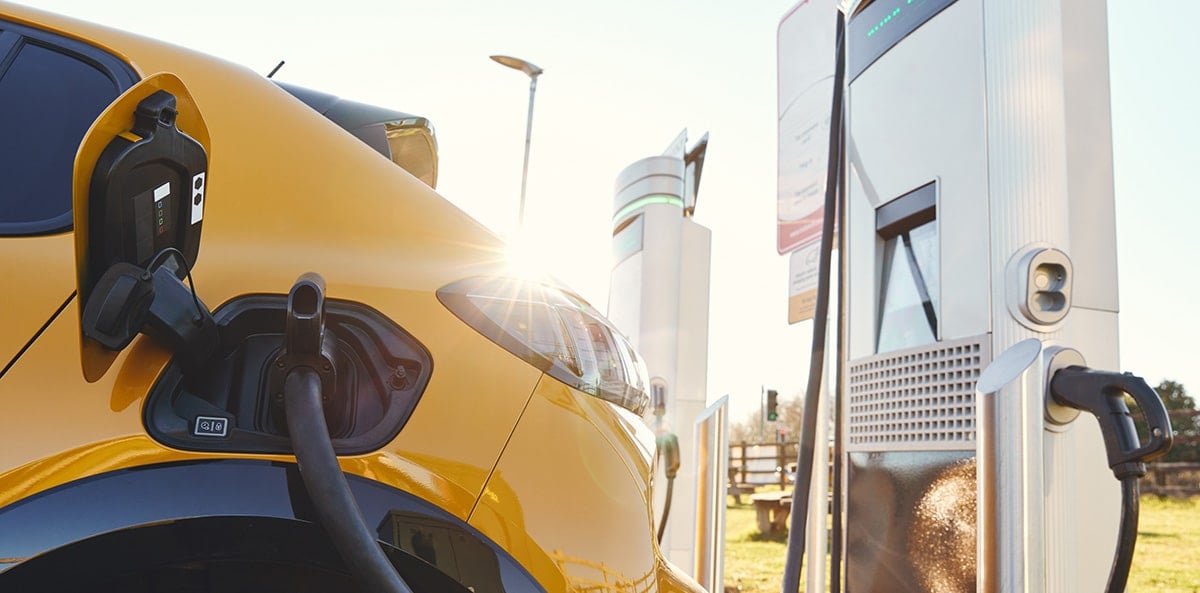How to start an EV charging business

Launching an EV charging business may seem overwhelming, but taking things one step at a time will help you successfully get your new venture off the ground. Whether you want to begin with a single charging station or build a larger charging network, let’s break down the important actions required to get your business going.
- What are the key steps to setting up an EV charging station business?
- Research the market and choose your business model
- Choose the right location
- Secure funding
- How much does it cost to start an EV charging station business?
- Purchase electric vehicle charging station insurance
- Set pricing and payment options
- Build business relationships
- Market your EV charging business
- Maintain and scale your business
- Get the best insurance for your EV charging station business with Insureon
What are the key steps to setting up an EV charging station business?
Starting a new EV charging solutions business requires careful planning. The right approach can help you minimize risks and build a solid foundation for future growth.
Here are the key steps to get started:
- Research the market
- Choose your business model
- Acquire necessary licenses and permits
- Choose a location
- Secure funding
- Build partnerships
- Obtain insurance
- Set pricing and payment options
- Market your business
- Maintain and scale your operation
Getting the right startup insurance protection should be a top priority. Plug-in electric car charging stations pose unique risks that standard commercial policies often fail to address, including electrical hazards, cybersecurity threats related to payment systems, and liability concerns in the event of a charging station malfunction.
Product liability insurance can also protect your business if a customer claims that your charging equipment caused damage or injury. Property owners may also require proof of coverage before they agree to a partnership and equipment installation.

Research the market and choose your business model
Finding a location that has a healthy demand for charging services is a crucial first step in establishing an EV charging business. You can conduct market research to see how many EVs are currently registered in your area, determine the number of existing stations, and study industry growth projections. Your state DMV website or local utility company may provide this data.
You’ll also need to select your business entity. The two most common types are sole proprietorships and LLCs.
- A sole proprietorship is the simplest and easiest business entity to set up, but it doesn’t provide any legal protection. Your personal assets could be at risk if your business is sued.
- A limited liability company (LLC), on the other hand, requires more paperwork to establish, but it separates your business from your personal assets, giving you stronger legal and financial protection.
As you create your business model, you’ll need to determine which type of EV charging business you’d like to run. Here are some of the pros and cons of each:
Fixed charging stations provide places for EV owners to park and charge, typically located at shopping centers, office buildings, and other locations.
- These businesses offer reliability for people who frequent the area and are easily scalable. Achieving success in one location will make it easier for you to negotiate partnerships with other property managers or owners.
- Permanent charging stations require a substantial upfront investment, and installation may take a long time.
Mobile charging services bring portable charging equipment right to their customers, whether they’re at home or in a public place.
- These businesses provide convenience for people who don’t have time or the ability to drive to a charging station.
- Mobile services require lower startup costs; however, scalability can be a challenge. Being able to only service one customer at a time means that growing your business will require employees and additional equipment.
Creating a map of the charging stations in your area will help you spot the holes in service. Determining the level of demand in your area, your budget, and how hands-on you’d like to be with your business should all factor into which model you go with.
What permits and regulations are needed to start an EV charging business?
The permits you'll need to obtain and the regulations you'll have to follow depend on where you operate. Be sure to research the EV infrastructure requirements at the federal, state, and local levels to ensure you’re fully compliant.
In addition to a business license, you’ll need to obtain the necessary electrical permits for your location, and work with licensed electrician installers who are bonded and insured to ensure the installation is done correctly to code.
Be sure to research zoning early to ensure EV charging stations are allowed and to understand any potential restrictions. Parking requirements are a common zoning issue you’ll need to investigate. Some municipalities may also limit commercial electrical equipment in residential areas.
Mobile EV charging providers also face extra regulatory considerations. You'll likely need commercial vehicle licenses and permits, and you need to consider regulations that involve storing property and transporting electrical battery systems and worker safety requirements.
Choose the right location
The next step in the process of how to start an EV charging station business is to find the best locations. Sites with the most potential are those with high traffic, convenient access, and that are close to activities EV owners can do while their vehicles are charging, like shopping.
Some of the best high-traffic locations for EV charging stations include:
- Shopping centers
- Gas stations
- Office buildings
- Residential complexes
- Hotels
- Hospitals
- Airports
- Entertainment venues
Partnering with property owners is a great way to secure locations for your EV charging stations. Many property owners know they’ll benefit from the arrangement because the charging stations will help attract customers. You can pay monthly rent for a space or structure a revenue-sharing agreement.
When evaluating any location, don't just look at the current traffic. Also consider any future development plans. New hospitals, shopping centers, and other facilities will need EV chargers, and getting in early could help you lock in a great site.
The location you select should also be clearly visible from the road and easily accessible, with parking spaces wide enough to accommodate a variety of EVs. Consider adding bright lighting and security cameras, so customers feel safe at night.
Secure funding
You'll need significant investment capital to start an EV charging business. You may be able to take advantage of multiple funding sources to get the money you need.
Here are the most common sources of business startup capital:
Bank loans
Many entrepreneurs use traditional small business loans from banks to help them get started. To qualify, you'll need a solid business plan, good credit, and detailed financial projections. Depending on the lender, you may also need to put up collateral.
Small Business Administration (SBA) loans
These loans are backed by the federal government and are offered by banks and credit unions. They typically have lower down payment requirements and longer repayment terms than traditional bank loans. Since they’re government-backed, lenders may be more willing to offer them to newer businesses.
Grants
Various federal, state, and local grants are available for clean energy businesses. While grants don't need to be repaid, they may have specific requirements about where you can install chargers.
Green energy incentives
Many utility companies offer rebates and incentives for installing EV charging stations, which can significantly reduce your upfront costs. Some utilities will also help with the installation or provide reduced electricity rates for charging stations.
Partnerships
By teaming up with another business owner, you can split the equipment and installation costs and reduce your financial risk. Although a partnership can help you get started, you'll most likely have to split any profits earned.
Tax credits for renewable energy investments
You may qualify for federal or state tax credits for the installation of EV charging equipment, which can make your investment much more affordable. Be sure to consult with a tax professional to make sure you’re taking advantage of all available tax credits and incentives.
Having the right (insurance) coverage protects you from potentially costly repairs, third-party injuries, lawsuits, and other expenses that could force you into bankruptcy or closure.
How much does it cost to start an EV charging station business?
Before you apply for funding, you'll need to know how much startup capital you'll need. The total investment will vary depending on the type and number of EV charging stations you'll be installing.
Here's a breakdown of the costs:
Licensing fees
You'll need to obtain the required licenses, permits, and inspections, which can vary depending on where you live. Don't forget to factor in annual renewal fees.
Charging equipment
The type of charger you choose makes a big difference in how much you'll need to finance. Level 2 chargers work well for locations where cars are parked for several hours. They typically cost $2,000 to $10,000 per unit.
Level 3 fast chargers (DC fast chargers) have a faster charging speed and can charge most EVs to 80% capacity in 30-60 minutes. They’re significantly more expensive, however. The typical cost of Level 3 fast chargers is $30,000 to $80,000 per unit. Many drivers prefer fast charging to limit their downtime.
Installation and electrical upgrades
The installation costs for EV charging stations can equal or exceed the equipment costs and will vary depending on the location. You'll likely need to run underground power lines, and sites may also require major electrical upgrades, like new transformers.
Leasing or purchasing land/property
The cost to purchase or lease a site for an EV charging station can vary a great deal. It depends on your market and the agreement you make with the site owner. Negotiating a revenue-sharing agreement with a property owner can reduce your upfront costs, but it’ll also reduce your profit potential.
Ongoing maintenance and software costs
Regular maintenance and software fees typically cost $300 to $1,000 per charger annually. This expense covers payment processing and remote monitoring.
Purchase electric vehicle charging station insurance
Like any business, an EV charging station business comes with risks. Having the right coverage protects you from potentially costly repairs, third-party injuries, lawsuits, and other expenses that could force you into bankruptcy or closure.
Here are the essential policies you'll need:
Commercial general liability insurance
General liability insurance protects you if someone is injured at your charging station or if your equipment damages someone's property. It covers medical bills, repair costs, and potential lawsuits up to the policy limits.
Commercial property insurance
Commercial property coverage protects your charging equipment from theft, vandalism, fire, and natural disasters.
Business interruption insurance
If your charging stations can't operate due to covered damage, business interruption insurance covers your lost income and expenses during the downtime. This policy is sometimes called business income insurance.
Equipment breakdown insurance
EV charging stations may fail due to power surges, mechanical problems, or computer malfunctions. Equipment breakdown insurance pays for repairs if your EV equipment breaks down.
Commercial auto insurance
Personal auto insurance typically doesn’t cover vehicles used for business purposes. If you operate mobile charging services or use vehicles for business activities, like transporting equipment, you'll need commercial auto coverage.
Cyber insurance
EV charging stations collect customer payment data and connect to the internet, which makes them targets for cyberattacks. Cyber insurance covers costs related to data breaches, hacking, ransomware attacks, and other cyberattacks.
Environmental insurance
Environmental liability insurance coverage protects against hazardous cleanup costs if your EV charging station causes environmental damage from a fire or other accident.
Set pricing and payment options
Your pricing strategy and the payment methods you accept influence whether customers will use your chargers. Most EV charging businesses use per-kilowatt-hour (kWh) pricing, which charges customers based on the actual amount of electricity they use. This model is simple and easy for customers to understand.
A flat-rate pricing model is another simple option. It charges a fixed fee regardless of the charge point. A potential downside of this model is that some customers may complain if they only need a small charge.
Offering membership plans can encourage repeat business. You could offer certain perks as part of a package deal, like reduced rates or priority access during peak times. This model works well if you have multiple charging locations in a community.
Also, be sure your EV charging stations accept the most common payment apps or RFID cards for convenience. The more payment options you offer, the more attractive your chargers will be for EV drivers.

Build business relationships
Success in the EV charging business often depends on the partnerships you make. The right partners can reduce your costs, open doors to new sites, and provide a steady stream of customers.
Be sure to talk to your local utility company since they may offer rebates that can cover some of your equipment and installation costs. They may also offer special electricity rates for EV chargers and help you work through the process of obtaining high-voltage electricity service for your units.
Many city and county governments are eager to support EV vehicle adoption to reduce emissions and encourage sustainability. They may offer grants, tax breaks, or faster permitting. Many municipalities also have economic development departments that’ll help you find locations and connect you with local business partners.
Don’t forget to look into partnering with existing businesses. These arrangements are often mutually beneficial. You get sites for your EV charging stations, and the site owners can attract EV drivers who are likely to visit their businesses while their vehicles are charging.
Market your EV charging business
EV drivers are unlikely to use your chargers if they don’t know they exist, which is why you’ll need an effective marketing strategy. Start by claiming your business on Google Maps so it will appear in search results. Then list your stations on popular EV apps, like Plug Share and ChargePoint, which is how most EV drivers search for chargers.
The partnerships you form with local businesses can also help you attract EV drivers. A business may advertise its chargers as an incentive to draw in customers. This arrangement benefits both you and your business partner.
Also, consider offering incentives to attract new customers, like a discount for first-time users. For example, you could offer free charging for the first 30 minutes, 50% off the first charging session, or a free membership trial. These promotions encourage customers to experience the quality and convenience of your chargers if they’re hesitant to try a new location.
Maintain and scale your business
You’ll need to regularly maintain your equipment to ensure it’s safe and reliable. Many charging station failures can be prevented through routine care. Schedule monthly inspections to check for damage, clean charging connectors, and test your payment systems.
Once your first location proves successful, growing your EV charging network can increase your bottom line. Consider targeting locations that serve different needs to grow your market reach. For example, if your first charger is in a retail parking lot, you might place your second in a residential area.
As demand grows, upgrading to faster chargers can increase customer satisfaction and revenue. Consider using a hybrid approach where you add one or two fast chargers alongside Level 2 charging units instead of replacing everything at once.
Finally, consider value-added revenue streams to improve the customer experience. For example, covered waiting areas, phone charging outlets, and Wi-Fi can improve customer comfort. Car washes and vending machines can be added later for additional income.
Get the best insurance for your EV charging station business with Insureon
It's easy to get insurance for your small business with Insureon. Just fill out our easy online application to receive quotes from trusted providers. Our expert insurance agents are available to answer any questions and help you find the best, most affordable small business insurance for your needs.
Most small business owners can get same-day coverage and easily download a certificate of liability insurance (COI) as soon as they purchase a policy.
Cyrus Vanover, Contributing Writer
Cyrus is a finance and insurance writer who is passionate about helping people and businesses succeed. He is also the author of the book "Earn a Debt-Free College Degree." He has written for some of the largest financial institutions in the country including TD Bank, Citizens Bank, and many credit unions. Cyrus has also contributed to Newsweek. Based in the Blue Ridge Mountains of Virginia, he enjoys hiking the local trails and exploring old Civil War battlefields and other historical sites in his spare time.









